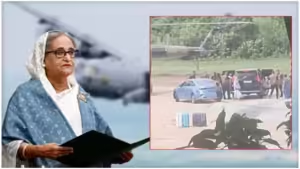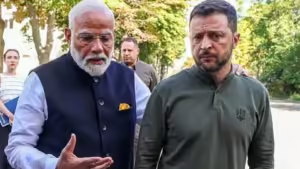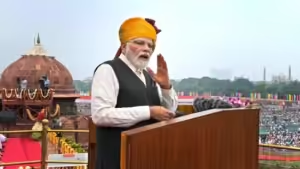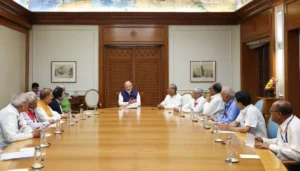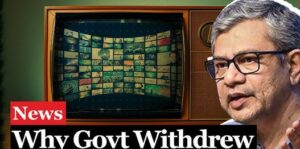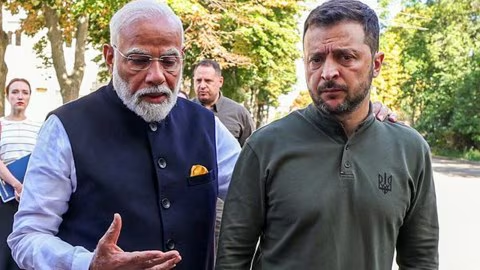
Modi meets Zelenskyy
India’s diplomatic strategy has often been described as one of maintaining a delicate balance between competing global powers, particularly in the context of the country’s aspirations to emerge as a significant global player. A striking example of this strategic balancing act can be seen in the simultaneous visits by Prime Minister Narendra Modi to Ukraine and Defense Minister Rajnath Singh to the United States. While these visits may appear coincidental at first glance, they could very well be part of a broader diplomatic strategy designed to bolster India’s standing on the international stage.
Modi’s Visit to Ukraine: A Statement on Global Peace and Stability
Prime Minister Narendra Modi’s visit to Ukraine, a nation at the epicenter of one of the most significant geopolitical conflicts in recent history, is particularly notable. This visit comes at a time when the world is closely watching the ongoing conflict between Russia and Ukraine, which has had far-reaching implications for global security, energy supplies, and international alliances.
By visiting Ukraine, Modi is making a statement on India’s commitment to global peace and stability. India, which has historically maintained a policy of non-alignment and strategic autonomy, is positioning itself as a nation that can engage with all parties involved in the conflict. Modi’s visit underscores India’s desire to play a constructive role in resolving global conflicts, while also signaling its support for the principles of sovereignty and territorial integrity.
Furthermore, Modi’s presence in Ukraine could also be interpreted as a signal to Russia, a long-time strategic partner of India, that while India values its relationship with Moscow, it is also committed to maintaining its ties with other nations and upholding international norms. This visit highlights India’s careful balancing act between maintaining its traditional alliances and expanding its diplomatic outreach to other global players.
Rajnath Singh’s Visit to the USA: Strengthening Strategic Ties
At the same time, Defense Minister Rajnath Singh’s visit to the United States reflects India’s ongoing efforts to strengthen its strategic ties with Washington. The defense relationship between India and the USA has grown significantly in recent years, with both countries sharing concerns about the rise of China and the need for a free and open Indo-Pacific region.
During his visit, Singh is expected to engage in high-level discussions on defense cooperation, technology transfers, and joint military exercises. These discussions are crucial for India’s defense modernization efforts, particularly as the country seeks to enhance its capabilities in the face of regional security challenges.
Singh’s visit also comes at a time when the United States is keen to deepen its partnerships in Asia, as part of its broader strategy to counterbalance China’s growing influence. India, with its strategic location and growing military capabilities, is seen as a key partner in this effort. By engaging with the United States on defense matters, India is signaling its willingness to play a more active role in regional security, while also ensuring that it has the necessary capabilities to protect its own interests.
A Coordinated Diplomatic Strategy
The timing of these visits suggests a coordinated diplomatic strategy by India. By engaging with both Ukraine and the United States simultaneously, India is demonstrating its ability to maintain relationships with a diverse set of global actors. This approach is in line with India’s broader foreign policy strategy, which seeks to maximize its strategic autonomy while also strengthening its ties with key global powers.
In conclusion, the simultaneous visits by Prime Minister Modi to Ukraine and Defense Minister Rajnath Singh to the United States are likely part of a sophisticated diplomatic strategy aimed at enhancing India’s global standing. These visits underscore India’s commitment to maintaining a balanced foreign policy, one that engages with all major global players while also protecting its own strategic interests. As India continues to rise on the global stage, such coordinated diplomatic efforts will be crucial in shaping the country’s role in the evolving international order.

